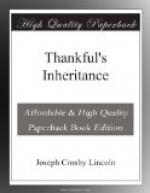“‘To think,’ says he, ’that I’ve lived all these years to be p’isoned fin’lly! And by my own sister, too! Well, that’s what comes of bein’ wuth money. Give me my pipe and let me forget my troubles.’
“’Course this kind of talk made Hannah mad, but she argued that ’twas the Kill-Smudge gettin’ in its work, so she put a double dose into his teacup that night, and trusted in Providence.
“And the next day she noticed that he swallered hard between every pull at his pipe, and when, at last, he jumped out of his chair, let out a swear word and hove his pipe at the cat, she felt consider’ble encouraged. She thought ’twas her duty, however, to warn him against profane language, but the answer she got was so much more prayerful than his first remarks, that she come about and headed for the sittin’-room quick.
“Well, to make a long yarn short, the Kill-Smudge done the bus’ness. Kenelm stuck to smokin’ till he couldn’t read a cigar sign without his ballast shiftin’, and then he give it up. And—as you might expect from that kind of a man—he was more down on tobacco than the Come-Outer parson himself. He even got up in revival meetin’ and laid into it hammer and tongs. He was the best ‘horrible example’ they had, and Hannah was so proud of him that she couldn’t sleep nights. She still stuck to the Kill-Smudge, though—layin’ in a fresh stock every once in a while—and she dosed the tea about every other day, so’s her brother wouldn’t run no danger of relapse. I’m ’fraid Kenelm didn’t get any too much joy out of his meals.
“And so everything was all right—’cordin’ to Hannah’s reckonin’—and it might have stayed all right if she hadn’t took that trip to Washington. Etta Ellis was goin’ on a three weeks’ cut-rate excursion, and she talked so much about it, that Hannah got reckless and fin’lly said she’d go, too.
“The only thing that worried her was leavin’ Kenelm. She hated to do it dreadful, but he seemed tame enough and promised to change his flannels if it got cold, and to feed the cat reg’lar, and to stay to home, and one thing and another, so she thought ’twas safe to chance it. She cooked up a lot of pie and frosted cake, and wrote out a kind of time-table for him to eat and sleep by, and then cried and kissed him good-by.
“The first three days after she was gone Kenelm stayed ’round the house and turned in early. He was feelin’ fine, but ’twas awful lonesome. The fourth day, after breakfast, he had a cravin’ to smoke. Told me afterward it seemed to him as if he must smoke or die of the fidgets. At last he couldn’t stand it no longer, but turned Hannah’s time-table to the wall and went out for a walk. He walked and walked and walked. It got ’most dinner time and he had an appetite that he hadn’t had afore for months.
“Just as he was turnin’ into the road by the schoolhouse who should come out on the piazza of the house on the corner but Abbie Larkin. She’d left the door open, and the smell of dinner that blew through it was tantalizin’. Abbie was dressed in her Sunday togs and her hair was frizzed till she couldn’t wrinkle her forehead. If the truth was known, I cal’late she’d seen Kenelm go past her house on the way downtown and was layin’ for him when he come back, but she acted dreadful surprised.




